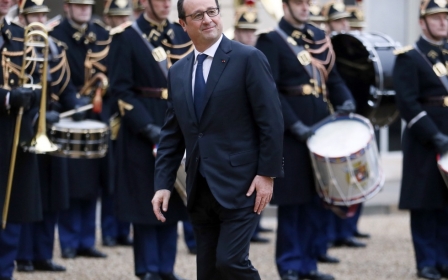Arab League announces support for Libya's House of Representatives

Officials from Libya’s House of Representatives secured the support of the Arab League chief, Nabil al-Arabi, after an emergency meeting in Cairo on Monday.
Leading figures from the House of Representatives (HoR), including the body’s president Aqila Salih, met with delegates from the 22-member regional body in Egypt.
Ahead of the meeting, the Arab League’s deputy head Ahmed Ben Hilli told reporters that delegates would discuss “the dangerous developments that Libya is experiencing, the increase in violence and acts of terrorism.”
These acts, Hilli continued: "are affecting not only individuals... but also vital economic infrastructure on which the wealth of the Libyan people depends, particularly oil storage tanks."
The meet was scheduled at the request of Libya’s delegate to the League, Ashour Bourashed.
HoR celebrates 'successful' meeting with Egypt's Sisi
Before the meet, leading representatives of the HoR met with Egyptian President Abdel Fattah al-Sisi, hoping to secure his support for their campaign against fighters allied to their rival government, the GNC.
During the conference on Sunday evening, HoR officials requested military aid from their ally, as well as help in securing spare parts for Libya’s electricity sector, badly damaged by ongoing militant attacks.
Aribi described the meeting as “successful,” telling al-Wasat that Sisi had promised to supply the HoR with “everything it needs.”
Egypt has been a consistent ally to the HoR throughout the protracted crisis, and has been accused of involvement in strikes launched by unidentified war planes against militia targets in Libya.
Libya's anti-militia forces, headed by former renegade General Khalifa Haftar, took delivery this week of four new Russian-made war planes in a deal thought to have been brokered by Egypt.
Calls to arm HoR against 'oppressive militias'
During the conference, Bourashed told League delegates that “the international community must take legal and moral responsibility” to halt the crisis in Libya.
“The international community must, without any delay, provide the Libyan army with weapons so that it is able to execute its national mission.”
“Any delay in putting a decisive military stop to the battle against oppressive militias in Libya increases their proliferation and reduces any chance at finding a political solution to the crisis,” Bourashed went on.
However, Libyan officials stopped short of requesting foreign military intervention in the crisis, which has seen armed militias allied to HoR's rival government take control of the capital.
Salih, who headed the Libyan delegation, rejected the idea of intervention, instead calling on the Arab League to help protect the country's "legitimate" institutions.
After the meeting, the Arab League's general secretary Arabi told reporters that the league supports Libya's "legitimately elected parliament," in reference to the HoR, which was democratically elected in June 2014, although the rival Tripoli-based parliament contests this.
While much of the national army has flocked to the Tobruk-based parliament, the opposing Libya Dawn militias control the capital and have thrown their weight behind the Tripoli government. Tobruk has tried to present Libya Dawn and the Tripoli parliament as being Islamist, while Tripoli accuses Tobruk of trying to reinstate pre-revolutionary rule and bring back officials loyal to former leader Muammar Gaddafi, ousted in 2011 by a NATO-backed uprising.
"A decisive position must be taken towards all acts of terrorism on Libyan soil, which are leading to chaos and a political and security vacuum in the country," Arabi said.
Arabi went on to call for both "action" and "dialogue" to prevent further escalation in Libya, which if left unresolved, could "tear the country apart" analysts warned this week.
An HoR official who spoke to Libyan newspaper al-Wasat on Monday evening said he “sensed the sympathy” of all Arab League member states with his government, especially the Gulf States.
Isa al-Aribi, who is in charge of the HoR’s energy portfolio, suggested that the bombing last week of the HoR’s headquarters in Tobruk helped the delegation to win the support of Arab League ambassadors.
According to Aribi, Arab League member states are now certain that the crisis in Libya is a conflict between “the will of the people and a bloc that knows nothing but violence".
HoR-allied troops have also bombed rival positions heavily in recent months, shelling Benghazi repeatedly and bombing Misrata, seen as a Libya Dawn stronghold, twice in less than a week.
Stay informed with MEE's newsletters
Sign up to get the latest alerts, insights and analysis, starting with Turkey Unpacked
Middle East Eye delivers independent and unrivalled coverage and analysis of the Middle East, North Africa and beyond. To learn more about republishing this content and the associated fees, please fill out this form. More about MEE can be found here.




